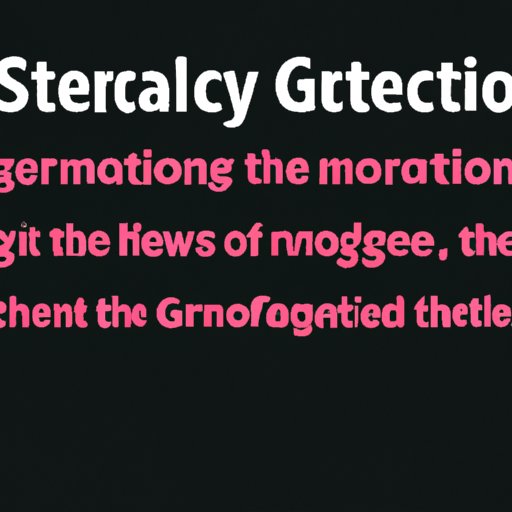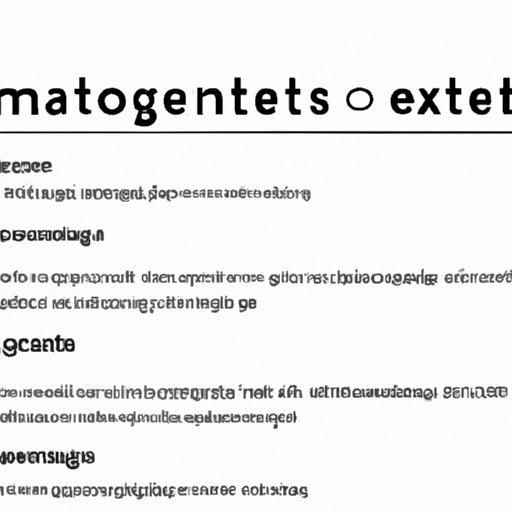Introduction
Generalizations are statements that describe a group or class of people, objects, or events in a broad way. A common example of a generalization is “all politicians are corrupt” – this statement describes all politicians, even though it may not be true for every individual politician. Generalizations are often used in literature to help create a sense of realism and engage readers. In this article, we will explore how authors use generalizations in literature and the power they have in storytelling.
Analyzing the Use of Generalizations in Popular Literary Works
Authors often use generalizations in their works to express a certain point or feeling. For example, in Herman Melville’s Moby-Dick, the narrator Ishmael makes generalizations about the sea and its creatures: “But however baby man may brag of his science and skill, and however much, in a flattering future, that science and skill may augment; yet for ever and for ever, to the crack of doom, the sea will insult and murder him, and pulverize the stateliest, stiffest frigate he can make.” Here, Ishmael is making a sweeping generalization about the power of the sea over mankind – a point that resonates with readers and helps to create a sense of realism.
In Harper Lee’s To Kill a Mockingbird, the narrator Scout makes several generalizations about life in the small town of Maycomb: “Maycomb was an old town, but it was a tired old town when I first knew it. In rainy weather the streets turned to red slop; grass grew on the sidewalks, the courthouse sagged in the square.” Here, Scout is creating a vivid picture of Maycomb by using generalizations to evoke a particular atmosphere. This helps to engage readers and creates a powerful image of the setting.

The Power of Generalizations in Storytelling
Generalizations can be a powerful tool in storytelling. They can help build a sense of realism by conveying a certain idea or feeling about a place or situation. For example, if a character is describing a bustling city, they might say “the streets were alive with activity” – this is a generalization, but it conveys a strong feeling of energy and life that helps to create a realistic image of the setting. Similarly, if a character is describing a desolate wasteland, they might say “the land was barren and empty” – again, this is a generalization, but it helps to create a vivid image of desolation.
Generalizations can also help to engage readers by evoking certain emotions or feelings. For example, if a character is describing a romantic moment, they might say “the night was filled with passion” – this is a generalization, but it conveys a strong feeling of romance that helps to draw readers into the story.

Exploring How Authors Create Meaning Through Generalizations
Authors use different types of generalizations to create meaning in their works. For example, they may use a specific type of generalization called an “epithet” to give a character a certain quality. An epithet is a descriptive phrase or adjective that is used to characterize a person or thing (e.g., “the brave knight”). Authors often use epithets to give characters certain qualities that help to shape their identity and create a sense of realism.
Authors may also use generalizations to convey a deeper meaning or message. For example, in F. Scott Fitzgerald’s The Great Gatsby, the narrator Nick Carraway makes a generalization about the wealthy elite: “They were careless people, Tom and Daisy—they smashed up things and creatures and then retreated back into their money or their vast carelessness, or whatever it was that kept them together, and let other people clean up the mess they had made.” Here, Nick is making a sweeping generalization about the wealthy upper class – a generalization that conveys a deeper message about the consequences of their actions and the lack of accountability among the privileged.
Conclusion
Generalizations are powerful tools in storytelling, as they help to create a sense of realism and engage readers. Authors use different types of generalizations, such as epithets and broader statements, to create meaning in their works. By exploring how authors use generalizations, we can gain a better understanding of modern literature and the ways in which authors create meaning through their writing.
(Note: Is this article not meeting your expectations? Do you have knowledge or insights to share? Unlock new opportunities and expand your reach by joining our authors team. Click Registration to join us and share your expertise with our readers.)
